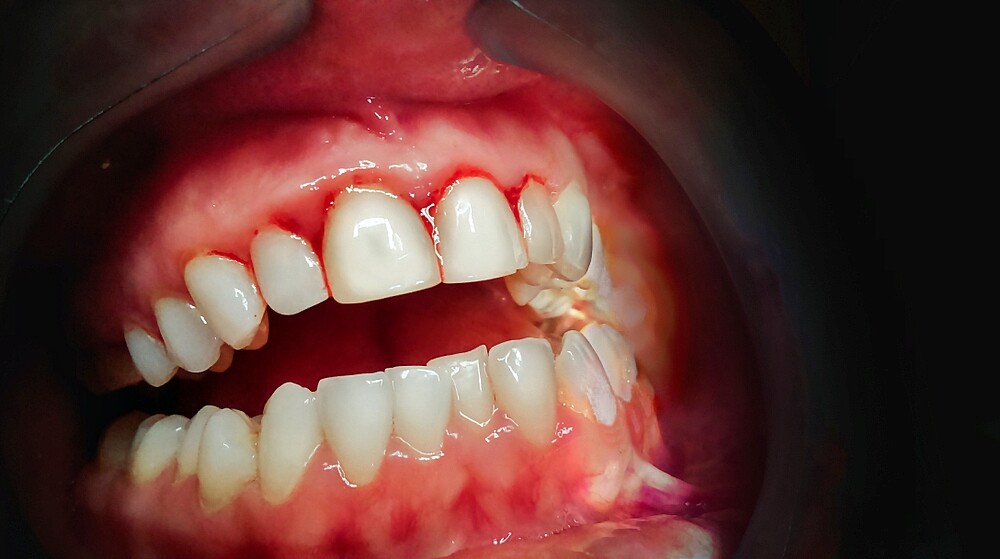Bleeding gums are not only unpleasant, it can even be dangerous. All information about causes, symptoms and prevention can be found here.
Bleeding gums are a warning signal from your body that you should take seriously. Because the basic rule is: healthy gums do not bleed.
Bleeding gums: Possible causes
In the most common cases, bleeding gums are caused by inflammation of the gums (gingivitis). Such an inflammation spreads to the gums when bacteria attach themselves to the tooth surface and harden there to form a solid plaque. Gingivitis can develop into dangerous periodontitis – the late consequence: tooth loss.
Gingivitis
Typical symptoms of inflammation of the gingiva are:
- Bleeding gums
- Gum recession
- Swollen gums
- Bright red gums
- Sensitive, sore gums
- Bad breath
Periodontitis
Gingivitis should definitely be taken seriously, as it can develop into periodontitis. In case of periodontitis, the inflammation has spread to the entire periodontal apparatus and leads to gum loss, bone loss and ultimately to tooth loss.
If the periodontitis is detected in time and the patient cooperates well, the bacteria can be kept in check and worse can be prevented. The loss of gums and bone cannot be reversed, but with proper treatment it can be stopped.
Necrotizing ulcerative gingivitis and periodontitis (NUG and NUP)
The necrotizing ulcerative gingivitis occurs extremely rarely, but it is all the more merciless. An initial inflammation in the interdental space develops at a rapid pace into a complete inflammation of the gums, which leads to loss of mucous membrane, bleeding gums, stubborn plaque, receding gums and pain. The necrotizing ulcerative periodontitis (NUP) of the entire periodontium also comes along with bone loss.
The risk factors
- Lack of oral hygiene
- Hormonal influences from pregnancy, puberty or the pill
- Taking medication, such as antiepileptic drugs
- Diabetes
- Malnutrition
- Excessive consumption of alcohol
- Smoking
- HIV and AIDS
How to do something good for your gums
If you don’t want to worry about supplementary dental insurance and dentures, if you love your teeth and take the warning signal seriously, you should talk to your dentist and take the following tips to heart. Because if the inflammation of the gums is caused by bacteria, you have your dental health in your own hands and can soon say goodbye to bleeding gums.
- Proper teeth brushing: Your dentist can help you learn the proper brushing technique for your teeth. Use a soft toothbrush and a mild toothpaste.
- Cleaning the interdental spaces: Most bacteria accumulate in the interdental spaces. They are difficult to reach with a toothbrush, you should use dental floss or interdental brushes.
- Nutrition and habits: Make sure you eat a healthy diet and do not eat too much sugar and acidic foods. Alcohol and tobacco, as well as too much stress, are poison for your gingiva.
- Professional prophylaxis: Regular visits to the dentist support you on the way to intact oral health. Doctors recommend professional teeth cleaning twice a year.
- Keeping your eye on the ball: Don’t throw in the towel if you bleed when brushing your teeth or if you use dental floss and interdental brushes. Many people neglect their oral hygiene for fear of further gum irritation, but the opposite would be the right thing to do. The fewer bacteria and plaque that settle on your teeth, the less chance there is of your gums fighting back with bleeding.
- Mouthwashes: Disinfecting rinses that kill germs can be used in addition to your daily mouthwash routine. If you like it natural, use sage tea or myrrh tinctures. In this way you create and maintain a healthy oral flora.

